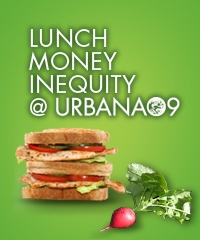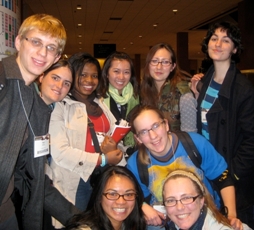Lunch money inequity at Urbana 09

Issues of inequity, poverty and the distribution of resources became intensely personal for nine students in the Domestic Poverty Track at Urbana 09. When they received their lunch allowance for five days of meals, each of them had been given a different amount of money, ranging from $20 to $100. Not fair? Yes, that’s the point…
This challenge was created by their InterVarsity staff workers, Silvia Kim and Ginny Murphy, who serve the InterVarsity group, “Workers of Faith,” at Mills College, a liberal arts all-female school in Oakland, California.
Silvia and Ginny were curious to watch how their students would react. “We hoped it would build community and a deeper sense of humility while reminding them of the systemic inequality of resources in America,” said Silvia.
“Before Urbana 09, our students served in the inner city communities of Oakland as preparation for the Domestic Poverty Track at Urbana 09. We wanted them to connect these experiences while embracing their own stories to deepen and create a more effective witness on campus and beyond,” added Ginny.
Follow their story… .
There were nine of us from our campus who arrived in St. Louis for the Urbana 09 Student Missions Conference on December 27, 2009. We were very grateful for the scholarships we had received from generous donors who had made our trip possible. We were told that we would also receive some funds for our lunch costs during the conference, perhaps up to fifty dollars. When we opened our “lunch allowance” envelopes, we were surprised to discover that each of us had received varied amounts of money; some students got $20 while others received $100 — grossly unfair!
Our staff leaders, Silvia Kim and Ginny Murphy, inserted a letter that challenged us to live in solidarity as a community, not only thinking of ourselves but instead living intentionally with one another. They reminded us of the biblical mandate, “Therefore if you have any encouragement from being united with Christ, if any comfort from his love, if any common sharing in the Spirit, if any tenderness and compassion, then make my joy complete by being like-minded, having the same love, being one in spirit and of one mind” (Philippians 2:1-2).
 We hoped this experience would make us more “like-minded” and intentional in loving our community by walking in the steps of those considered “lesser than” in our world, and discovering what it means to truly say, “I am hungry.”
We hoped this experience would make us more “like-minded” and intentional in loving our community by walking in the steps of those considered “lesser than” in our world, and discovering what it means to truly say, “I am hungry.”
“I felt that Workers of Faith finally became like-minded and bound together in spirit and truth,” said Magee Page, an environmental science major. “We grew in loving each other more than ourselves and not holding our own interests as top priority.”
When we read the letter, our first thought was to pool our varied amounts into one large allowance to be shared by all of us. But God had greater plans for our group. All of us come from different class backgrounds where obtaining food involves other sacrifices in order for one’s family to survive. No, we did not choose to fast away our lunch periods for the entire week. Instead, we considered what amount we’d truly need to survive per day ($5 each) from the total of $380 to be shared by all nine of us. Then we donated what was left to the Urbana 09 offering which raised $890,000 to benefit multiple causes around the world.
Together we discovered what it means to live humbly on meager meals at little cost. “I felt so blessed and privileged to be at Urbana with my co-workers in ministry that I didn’t see any reason not to give back such privilege,” said Colleen Kimsey who is majoring in political, legal and economic analysis.
By planning together and seeking to spend the very least amount, we are learning what it takes as a family to walk humbly in our own intentional domestic poverty. This will help us identify with our own impoverished community in Northern California.
“Since we are in Urbana’s Domestic Poverty Track, we aren’t here on vacation,” said first-year student Shana Roark. “We started preparing for Urbana months in advance back in Oakland by visiting recycling centers, helping with a community breakfast in West Oakland and cleaning a church’s building to prepare for a community resource center. Now we are at Urbana continuing to learn about domestic poverty. When we can go back to our campus, we’ll act on what we’re learning so others can benefit too,” said Shana.
At times it was difficult to buy less at lunch when we chose to forgo the usual drink to go along with the meal. But it has taught us that our wonderfully almighty God is always providing for us. Bianca Louie, a public policy major, found this to be true when she had only a limited amount to spend on lunch and couldn’t buy a drink. “Some guy gave me a free water bottle after I bought the small meal,” she said. “God always knows, and he knows what I need.”
“And this is what Urbana is all about: learning to meet people on their terms and stepping down if you’re in a place of power,” said Paul Stokes, Magee’s fiance and a pre-dental major at De Anza College.
After Urbana, we are prayerfully continuing this journey of walking humbly with all of our brother and sisters. We are intentional about living out the prayer of Jesus: “Father, I want those you have given me to be with me where I am, and to see my glory, the glory you have given me because you loved me before creation of the world” (John 17:24).
Jesus used our lunch money challenge to strengthen the bonds of our community with his lavish love and abundant grace. Now we are eager to share all that we have with a hungry world.
— from Workers of Faith, the InterVarsity group at Mills College






